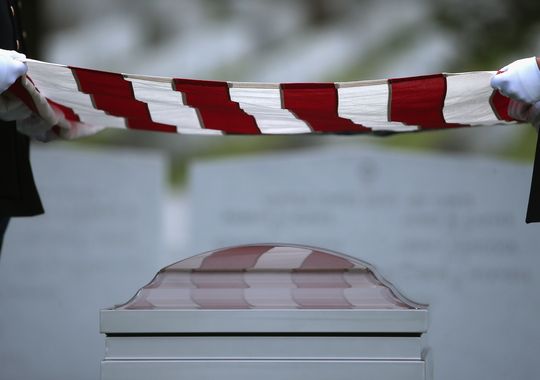Arlington Cemetery Has a Burial Backlog Problem
Don R. Sykes was killed in Vietnam on Aug. 12, 1969. Ten days later he was buried in Arlington National Cemetery.
His widow, Lorraine Tharp, isn’t eligible to be buried with Sykes because she remarried, but her current husband is a Vietnam veteran, and she thought they would both be buried there.
Tharp’s plans changed after a recent visit to the grave of her first husband.
Talking to some grounds workers at Arlington she learned it takes up to seven months for interment at Arlington.
“That’s how backed up they are,” said Tharp, who lives in Maryland but spends her winters in Florida. “This is outrageous to me … There’s no reason for families to go through that.”
A News-Press analysis shows the average time for interment of a body or an urn at Arlington was 4.5 days for a service member who died on Feb. 1, 1980. The average time for the interment of remains of a service member who died on Feb. 1, 2013, was 174.3 days, nearly six months. The analysis discarded outliers — those buried or inurned a year or more after death — in order not to skew the results. Some of that time can be attributed to families wanting to wait for a convenient time to bury their loved ones and gather the family. But even families who want a quick burial are required to wait months.
Melissa Bohan, a public affairs specialist for Arlington wrote in an email, “Currently, the length of time from the first call from the family or funeral home wishing to schedule the service, until the service takes place, does not generally exceed six months — the average is about four months — six months would be for families wishing to have full military honors, a chapel service beforehand, etc.”
“The (families) are shocked when we tell them the reality,” of the wait time for Arlington, said Shannon Mullins, owner of Mullins Memorial Funeral Home and Cremation Service in Cape Coral and Fort Myers. “They look at us like we don’t know what we’re talking about.”
Arlington doesn’t allow advance planning, Mullins said. The person has to have died before Arlington is contacted.
Once the paperwork is submitted, the wait is at least two weeks before the person is approved for burial, during which time you hear nothing, Mullins said. Then it’s another five to six weeks or even longer, he said, before you find out the date for your service, which will be months away.
Meanwhile the body or cremains must be stored somewhere, Mullins said, which can be expensive. Depending on the funeral home, the cost is up to $200 a day after the first 10 days, but some funeral homes will work with families to mitigate the cost.
“Arlington prefers the person reside at the funeral home (in the city) where the death occurred,” said Tanya Scotece, a licensed funeral director with Farley Funeral Homes and Crematory in Venice and North Port. Scotece said the average wait time before casketed remains to go to Arlington is about three months, but the funeral home has held people’s remains as long as eight or nine months.
A family can get shorter wait times if they opt not to have a service at Arlington, Scotece said. In those cases the family conducts funeral and visitation locally and then leaves the funeral home to arrange for transfer and burial at Arlington.
Arlington National Cemetery receives 35 requests a day to schedule a service, Bohan wrote. The cemetery conducts 27 to 30 funeral services every weekday, except holidays, and will also conduct six to eight services on Saturdays.
The number of services at Arlington has increased over the years. In fiscal year 2000, Arlington Cemetery conducted 5,512 services. The average times for burial during the two dates researched for that year were 32.2 days and 18.4 days. In fiscal year 2013, when Arlington conducted 5,841 services, the average time to interment, for the two dates in the analysis, were 174.3 days and 151 days. That means the number of services increased by just under 6 percent, and the time to burial increased an average of nearly 543 percent.
With requests for services outpacing the number of services conducted by at least 50 a week, Arlington is poised to fall further behind and wait times will increase. Bohan said the process to schedule services had improved over the past four years. They now use a case management software system to receive and track requests, for example. They have a dedicated call center and provide more information about the process, which helps families. But as far as how long it takes, and whether those times will shorten, Bohan offered no assurance.
Read full article from News-Press.com
Photo Credit: Photo: Getty Images




